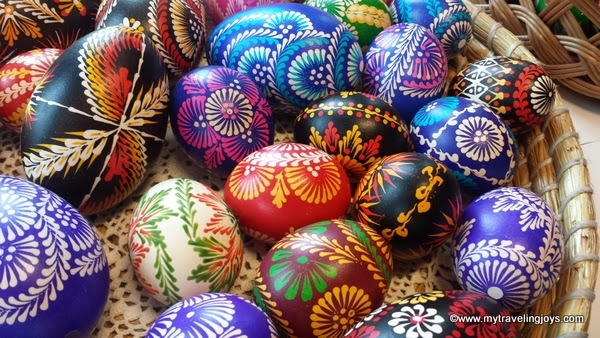Celebrating
Easter after a long, gray Polish winter is a wonderful way to harken
spring.
Luckily,
I have witnessed three Easter seasons here in Warsaw. I absolutely love the colorful pisanki (painted eggs) that are sold at small shops and special
Easter markets. Now, I have a collection of both wooden and real eggs that will
always remind me of our expat years living in Poland. Many of the egg vendors sell these special eggs at my favorite
market, Hala Mirowska.
Last
year, we watched one of the most celebrated Polish Easter traditions in Warsaw’s
Old Town. On the Saturday before Easter Sunday, Poles flock to their local
churches, carrying decorative baskets filled with special items to be blessed. The
Swieconka tradition means the
baskets are lined with a white linen or lace towel and contain eggs, kiebasa,
salt, candles, cheese or butter shaped like lambs and more. Each item
represents something in the Christian faith. To see a diagram of Easter basket items and the
symbolism, click here.
 |
| This year, I made this Easter basket filled with chocolates, salt, cheese, kielbasa, horseradish and other sweets for a Polish friend. |
At
the church, the priest then sprinkles the individual baskets with Holy Water
and gives his blessing in front a crowd. It was cute to watch the young
children who are dressed up in their white Easter Sunday dresses or button-down
shirts and pants. If you visit Poland during the Easter season, I definitely
recommend finding a church to observe this tradition.
 |
| Bread shaped like lambs for Easter. |
 |
| Some of the specialty shops sell the traditional Polish Easter baskets. |
 |
| Or homemade Polish cheese in the shape of lambs and chickens. |
On
Palm Sunday, which takes place the weekend before Easter, you’ll find local
vendors and even older Polish ladies selling decorative “palms.” Since Poland
doesn’t have palm trees, the locals make these palms from dried wheat and
flowers, fresh greenery and pussy willow (bazia)
branches.
Then,
since many Poles fast during the 40 days of Lent before Easter, the feasting
begins in earnest on Easter Sunday. During the week before this, the grocery stores and markets are a frenzy
of kielbasa-pork-sweets purchases! Last year, I made Polish zurek soup, which is one of my
favorites, for the first time at home. The soup is made from a fermented rye flour
base and contains kielbasa and hard-boiled eggs. This article describes in
detail the Polish Easter foods
and includes some recipes.
We
may not be Polish, but we’ve enjoyed seeing the different Polish Easter
traditions here in Warsaw.
Happy
Easter and Smacznego!











Those eggs are beautiful! Happy easter to you, Joy!
ReplyDeleteI love the eggs too! And Happy Easter to you as well!
Deletei remember people doing this with their easter baskets when i was little. i wonder if my paska is an american polish tradition? have a happy easter joy!
ReplyDelete@Joyce, I'm also very curious if the paska is either a Polish-American tradition or from another region in Poland?? Have a delicious Easter with your family!
DeleteHappy Easter ;) I love Polish Easter and our tradicional meals. I don't know what you mean - what is paska?
ReplyDeleteHi Anna! Happy belated Easter to you too! Paska is a Polish-American braided bread served for Easter. The flavor seems to be very similar to the Polish babka cake. :-)
DeleteSo colorful! And the lamb-shaped foods! Now I know when I'm visiting Poland :-)
ReplyDelete@Heather, tak, Easter is a wonderful time to visit Poland! :)
DeleteHi Anna! Happy belated Easter to you too! Paska is a Polish-American braided bread served for Easter. The flavor seems to be very similar to the Polish babka cake. :-)
ReplyDelete